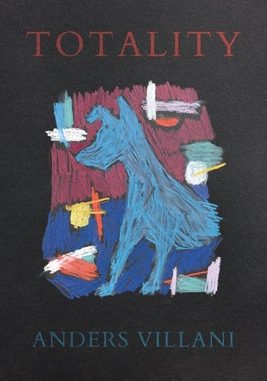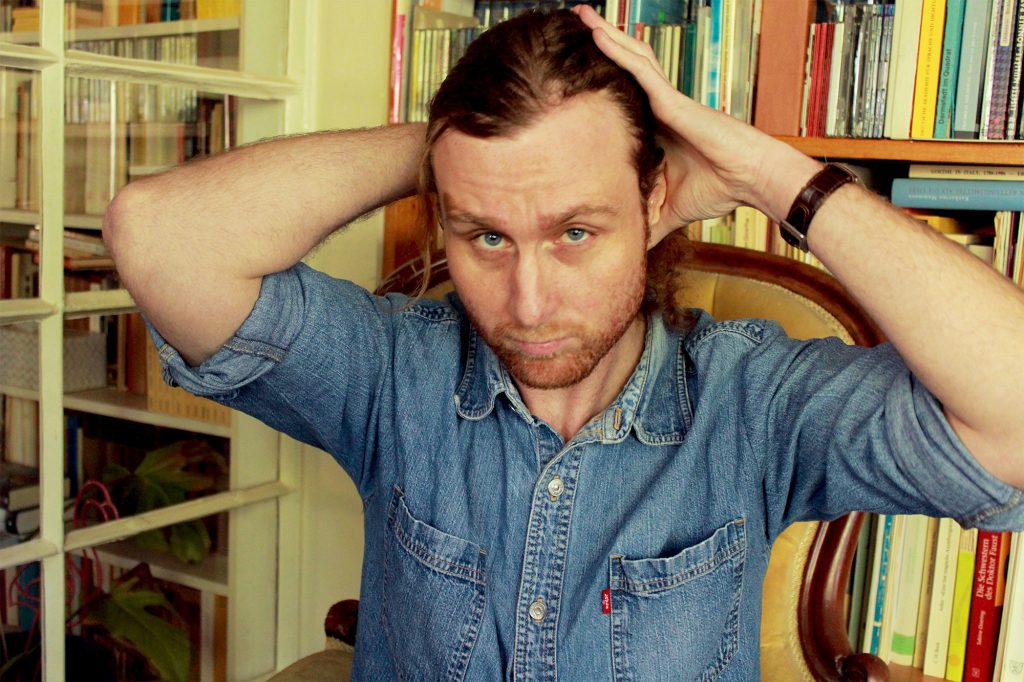
It’s ironic that I’m writing this review the morning after a total lunar eclipse. Ironic because this is not only the event that Anders Villani structures his second-coming poetry collection around, dividing the collection into the four phrases of the eclipse—but also the moment I managed to miss despite it first lighting up my socials, and then literally lighting up the sky. Totality, incidentally the title of Villani’s collection, describes the exact point between second and third contact when the moon’s disk completely covers the sun, spraying light across our atmosphere and turning the moon a blood red. And it is this image, as well as the slow convergence and reveal of the moon across the phases of an eclipse, that denote the ‘tellable’ and ‘untellable’ unravelling throughout Totality—a collected work that explores trauma’s reverberations in a body that just can’t help remembering.
Fortunately, unlike the eclipse, I can return, time and again, to Villani’s work. This is a must, considering the formidable architecture, extended lyricism and profoundly idiosyncratic poetic and personal conflicts at play here—the constant to-and-fro between things hidden and those revealed.
In an early poem, ‘Pedagogy’, images are consciously and consistently obfuscated, allowing the poem to speak to the often polarised paradigms of rural masculinities, both desired and inherited, both shame-filled and shameless. Personified through the imperative second-person ‘you’, the poem embodies a sparring match that implies the nature of disclosure and concealment as trauma-informed, as masculine—and inevitably, their irreconcilability. Villani elegantly disrupts meaning through parallelism and enjambment using an A-line indent followed by a B-line outdent. This format creates a rigid roll of centred text that asks us if there is meaning or a lack thereof, exacted in the positioning of opposites:
‘You don’t teach them mouth, aperture,
sputter, curdle, but leopard
cub and teat…’
Juxtaposing images of animal rearing, Villani shows conflicting accounts of how we care for ourselves and others: rope-taught, compartmentalised and mechanical— ‘the mouth’, ‘the aperture’; or intimately engaged through an awareness of shared life—’ cub and teat’. The inference is that the doctrines of patriarchal masculinities rupture us from our truer selves, as does trauma, which reminds me of bell hooks writing about the first act of male violence being a form of self-mutilation, and how this engenders violence against others. Villani later writes:
‘They don’t need to be retaught. You
don’t teach them rock
opens to dirt when it finds a nape…’
At once, Villani shows the violence of male self-objectification—of understanding the male body as embodying an infallible vessel, in this case, a ‘rock’, evidently impermeable to future pain. Too, he observes how violence is propelled, not softening into ‘dirt’ when coming in contact with the intimate, ‘the nape’—instead, opening it up, rejecting care. Villani proceeds to ask, throughout the collection, how bodies that have become synonymous with privilege and power (aka male, able-bodied)—schooled in systems of shame that expect infallibility—can relate experiences of extreme violation and utter powerlessness.
The poem ‘Interval’ (a recurrent title in the collection) opens as ‘the garage door lowers’—a disquieting allusion to a suicide attempt, Villani writing ‘there is no afternoon’. And yet, a suggestion of innocence, perhaps lost, perhaps lingering, as the subject ‘ease[s] the bike incline to level’, bars the doors, and then admits to 3 things like a child counting off his fingers, each relatively innocuous when observed in isolation. Cumulatively, these images—one: a volcano panorama swaying on a floor; two: a shirtless self in a mirror; three: ‘doghair and pinkish lint on the drier’—embrace the minuteness and specificity of embodied flashbacks, but also the fragmentariness of trauma as relived, as retold.
As psychologist Judith Herman writes, ‘The conflict between the will to deny horrible events and the will to proclaim them aloud is the central dialectic of psychological trauma.’ Like many poems in the collection, this poem may embody a desire to reconcile this central dialectic. So compartmentalised, so specific, so lacking in context, these three images constitute acts in remembering and forgetting—as Villani puts it, ‘intervals of thrash and limpness’ (another recurrent line), where power is dispelled, regained but ultimately called into question. Villani, through experiences minutely intimate, through language evocatively poetic and architectural, is able to reveal and conceal simultaneously. Poetry, it seems, for Villani, is both the shield and the microphone.
One of the longer poems in the collection, ‘Map to Mutable Manhood’—arguably my favourite Villani poem, and introduced in ‘Third Contact’—tells of a 20-something rolling through tender and violent intimacies, both embodied and observed. As a boy sleeps with his friend’s seventeen-year-old sister, holding her face with hands like a ‘Callused / gondola’ (pg. 83), his group of mates fuck the ‘fat local girl’, telling the boys they blew ‘all over’ her. As Villani writes:
‘Songs fathers won’t sing to sons
Until they’re ready. Epics, anthems, manifestos, prayers.
Rebuke yourself for not going.
You’re a pussy. A weak faggot, like the joke. Fuck you
and the jetty squids you watched
once the others had left for the house down the road,
the squids you told secrets.’ (p.84-85)
Again, we see this push and pull between the vulnerable and the brutal, the concealed and revealed, secrets expunged in waters full of squids. While sexual violence is celebrated, even bragged about. Terrence Real, an American psychologist who predominantly writes about masculinity and relationships, speaks to how men are ‘schooled in abuse’ (Real, 1997, p. 118). This schooling and its shifting and yet ever-violent paradigms are never more evident than in this poem, again relating a dialectic poised between exposure and secrecy.
When it comes to talking about these doctrines of masculinity, of these polarising and unreconcilable distances between the self as powerless and the self now seeking power through language—the dichotomy of the concealed and the revealed—there are few poets more skilled than Villani in Australia. Perhaps, though, one frustrating element to Villani’s collection, for me, made here self-referential in the noted ‘squids’—those ink-spilling underwater critters—is that the poems, at times, are too self-aware, too shackled to pre-conceived ideas of the poet, to notions of the poet’s architecture, to what poetry must constitute. Here, in a country where poetry is so undervalued and the industry so small, this is understandable; there is an expectation of sound, style, and movement—an often implicit but sometimes explicit demand for the obscure, the mystic, the cryptic, over the lexiconic, the direct, the digestible.
Recently a poet friend told me he was joking with his mate about poets jumping hurdles trying to avoid words as macabre as ‘tree’ (‘oh, look, the broccoli is malting’, they might say). It seems that poets are told, time and again, that they must write poetry—not just write. As a poet myself, I know how this can affect the work, especially when the poet tries to reject these expectations—in learning, tries to unlearn. So often, when we just try to write, the poet’s register enters the frame unconsciously. It abruptly disrupts the reading—making the reader acutely aware they’re reading poetry, an object densely constructed, adhering to form, adhering to craft, instead of making these factors invisible. The poem in this sense, like the poet, becomes self-aware, and the craft of writing good poems becomes the craft of being a good poet. I see this so often in jarring shifts in register—in a scaling from the informal and lexiconic, to the formal and obscure, as if the poem is trying to justify the stanza before by slipping ‘poetry’ back in—by obfuscating the direct.
In the States, there’s a whole world of poets, however, who’ve mastered this slippage—and can weaponise it in impressive and surprising ways. Claudia Rankine, Anne Carson and Ocean Vuong, to name a few. And true, there’s a growing movement, or perhaps a resurgence, of Australian poets capable of scaling up and down register when needed—people versed in slippage who rarely, if ever, let the poet aesthetic, the poetry of the thing, disrupt the overall movement. Poets like Hasib Hourani, Anwen Crawford, Dan Hogan and Harry Reid are experts in complex register shifts. Magically, in these shifts, they rarely, if ever, shake us out of the work, or make us acutely aware that what we’re reading is this thing called poetry.
Villani, too, is profoundly adept at these shifts—to suggest otherwise would be dishonest. Here is a poet clearly at the height of his craft. And yet there are times when the intrusive authorial voice—or poetic voice—subsumes the subject’s voice, resulting in the odd jarring sentence construction or over-calculated word choice. It’s as if Villani is saying in these moments: I must be a poet. I won’t name the handful of times this happens in the collection (honestly, it’s rare, and I’m being picky). However, I’ll signal to the passage above: why the word ‘rebuke’ when the language surrounding it leans so heavily on the conversational, the juvenile, the colloquial? Was this the product of a deep reverence for craft—an overworking?
Perhaps Villani could argue these slippages, these shifts in register, signpost the distances and proximities he notes in trauma discourse, and for which I’ve discussed; maybe the poet has to be there, always self-aware, to continue to conceal, to create physic separation. Perhaps this is a failing of me as a reader in respecting craft, though I suppose I hoped as the collection progressed for less concealment, not more; much like the lunar phases, I wanted revelation, directness—less neat poetic tricks. Though, maybe considering the collection’s focus on childhood trauma, this is asking too much—perhaps I should be critiquing an industry that consistently expects all your traumas laid bare. I’ll say, though, I remain hungry for more lines as simple, direct, and punchy as this:
‘I still wonder if being violated
made me a better person. A gentler man.’ (p. 126)
Regardless, Villani is an expectational poet, the sort of poet many of us dream of being. And there are so many startling, memorable lines throughout Totality which made me return many times to watch words and meanings expand and contract, yet never quite reveal themselves in full. In Villani’s ability to balance the unreconcilable, to melt the abstract into the intimate, to fuse the lexiconic with the painfully poetic, Totality is a powerful evocation for work that’s both searing and quiet, both overstated and understated—both a punch thrown and a punch drawn.
Reviewer bio:

Tim Loveday is an award-winning poet, writer, and editor. As the recipient of a 2021 Next Chapter Wheeler Centre Fellowship and a 2022 Writing Space Fellowship, his work focuses on Australian masculinity, intergenerational violence, and rural communities reckoning with climate collapse. His poetry/prose has appeared in Meanjin, Overland, The Griffith Review, Cordite, Suburban Review, Mascara, and The Big Issue, among many others. In 2022 he won the Dorothy Porter Poetry Award and in 2021 he was Highly Commended in the Southern Cross Short Story Award. A Neurodivergent dog parent, he the verse editor for The Creative Hub of Extinction Rebellion and the ongoing convener for curate||poetry: where word art meets wall art. He is represented by Jacinta di Mase agency; they are currently shopping his verse memoir, ‘your father was a bastard’. You can find out more at: timloveday.com.
Did you enjoy this article?
Sign up for my email newsletter to ensure you don’t miss a new article from The GW Review! Get my FREE 5-DAY email course on how to show, don’t tell in poetry, when you sign up today.
Want to submit to The GW Review?
The GW Review is an online literary journal seeking submissions of poetry, poetry book reviews, and music and poetry-themed feature articles. Send an email to the editor via contact@gemmawhite.com.au
Want to donate to The GW Review?
Your donations help pay the writers who submit their articles, book reviews, and poetry to this website.

I chanced upon you beautiful review Tim Loveday. Now I want to read Totality. Thank you!